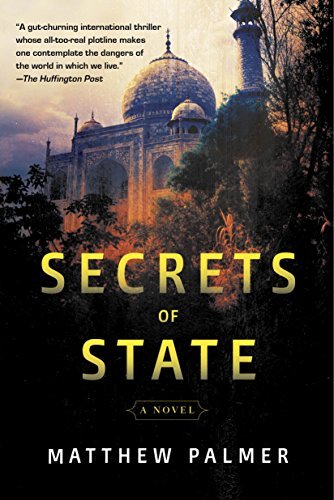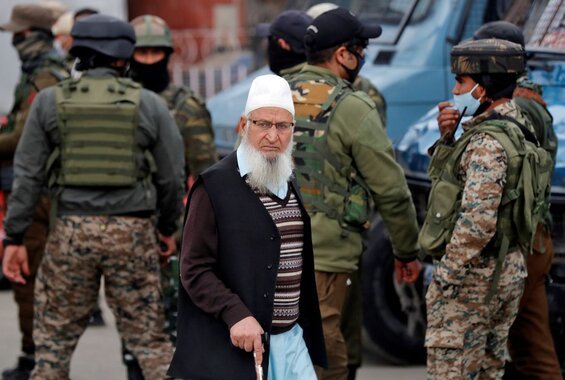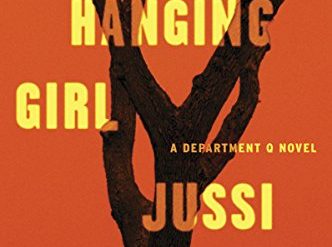
In his first novel, The American Mission, veteran US Foreign Service Officer Matthew Palmer raises uncomfortable questions about how American foreign policy is made. He finds the answer in Central Africa: corporate interests call the shots. And the story, although exaggerated for dramatic purposes, is credible at its core. Palmer’s second novel, Secrets of State, is far less satisfying. Posing the same question about the origins of policy, he tells a tale about a deep state conspiracy so vast and insidious that it could go head-to-head with QAnon.
A fabricated report turns up in intelligence findings
Palmer’s protagonist is Sam Trainor, a brilliant senior Foreign Service Officer who has specialized in South Asian affairs for decades. He is bluntly outspoken and has a history of antagonizing those higher up on the food chain. Convinced that he will never reach the senior-most ranks in the State Department, he accepts a position with a Virginia-based consulting firm that has nabbed a huge contract with the department. At Argus Systems, he leads a small team of South Asia specialists who sift through all the raw intelligence about India and Pakistan from throughout the national security community. And there he stumbles across a terrifying report that he knows has been fabricated.
Secrets of State by Matthew Palmer (2015) pages ★★★☆☆

An intelligence-sharing system bound to antagonize
A transcription of an intercepted phone conversation between two senior officials in the Indian foreign service reveals that both are bent on forcing their prime minister to move toward war with Pakistan. But one of the two is Vanalika Chandra. She’s the political officer in the Indian Embassy in Washington, and Sam has been having an affair with her. He knows she couldn’t have made that phone call because she was with him for the weekend in an isolated cabin without telephone access.
Unfortunately, the fictional transcription will doubtless make its way to Islamabad through a recent intelligence-sharing arrangement. By agreement with the two nations, the US provides highlights of its findings in India to the ISI in Pakistan and those in Pakistan to RAW in India. That puzzling arrangement itself may well be the product of a deep state conspiracy. And reports like the manufactured phone conversation will move the two nuclear-powered countries close to a catastrophic war.
A deep state conspiracy close to home
To learn where the fabricated report could have come from, Sam turns to Andy Krittenbrink, a friend who had worked for him in the State Department Bureau of Intelligence and Research. What Andy finds raises Sam’s hackles. Because the source of the document turns out to be Argus Systems, where Sam is now working. And when Andy shortly turns up dead, Sam knows he has stumbled upon something very, very big. Which proves to be a centuries-old conspiracy deeply embedded in the US Government. A conspiracy that threatens to start a nuclear war.
Palmer writes well. And Secrets of State cannot be criticized for lack of suspense. Unfortunately, though, the plot turns on two astonishing surprises, both of which seem exceedingly unlikely. And that deep state conspiracy is not to be believed.
About the author

According to his biography on his publisher’s website, “Matthew Palmer is a twenty-year veteran of the U.S. Foreign Service, currently serving as the director for multilateral affairs in the State Department’s Bureau of Asian and Pacific Affairs. A life member of the Council on Foreign Relations, Palmer has worked as a diplomat all around the world.” For a time in 2018, he served as an Acting Deputy Assistant Secretary of State. Secrets of State is the second of the four novels that reflect his experience in government.
For more reading
Previously I reviewed Matthew Palmer’s spine-tingling first novel, The American Mission (A diplomatic thriller set in a country where more died than in the Holocaust). It’s much more balanced and credible than Secrets of State.
You might also enjoy my posts:
- The 10 top espionage novels reviewed on this site;
- 20 good nonfiction books about espionage; and
- Top 10 mystery and thriller series.
If you read spy thrillers, consider dipping into the work of these other excellent authors:
- The spellbinding thrillers of Robert Harris
- Top-notch spy novels from Alex Gerlis
- The 12 novels of Alex Berenson’s thrilling John Wells spy series
And you can always find my most popular reviews, and the most recent ones, plus a guide to this whole site, on the Home Page.

























